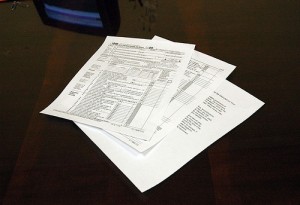 Do you meekly send your client’s tax return to creditors at their request? Two different authorities suggest it isn’t necessary.
Do you meekly send your client’s tax return to creditors at their request? Two different authorities suggest it isn’t necessary.
One of the stick-it-to-the-debtor provisions of BAPCPA is the mandate that the debtor provide a copy of his tax return to any creditor who requests it. 11 USC 521(e)(2). [I wonder that the reform law didn’t also require the debtor to strip naked at the 341.] Consider these defenses to such requests.
Case Law
Two reported cases denied creditor motions to dismiss the debtor’s case for failure to turn over the tax return to the creditor. In each case, the court found that the creditor’s request was made after the return was provided to the trustee. Fontaine, 397 B.R. 191; Collins, 393 BR 835. The statute clearly provides that the debtor provide it “at the same time” as provided to the trustee. Creditor delay was fatal to their request.
So, send the trustee the tax return immediately on filing, and the creditor is deprived of §521 as a weapon against the debtor.
EOC Guidance
The administrative office of the courts issued a memo to judges at the inception of BAPCPA on procedures to protect information in tax returns . While the provisions of this guidance deal with tax returns filed with the court under § 521(f), the logic behind the procedure for a creditor to obtain access to the debtor’s tax information on file with the court seems equally applicable to tax information requested of the debtor.
Here’s the text of the tax return guidance .







